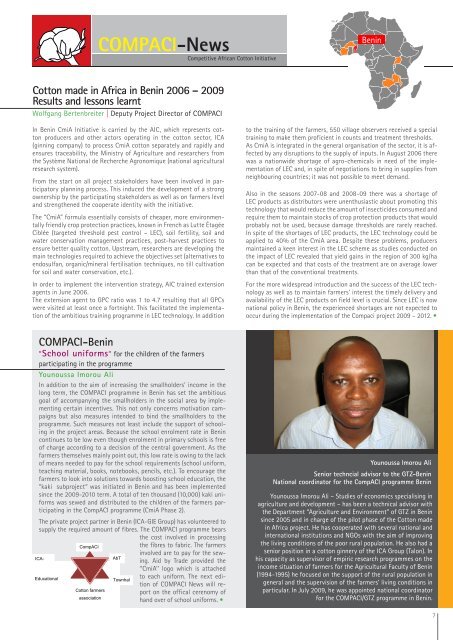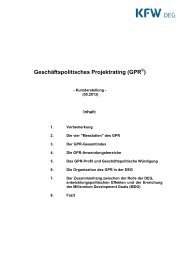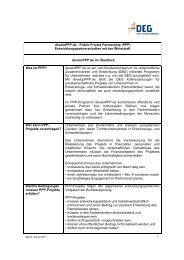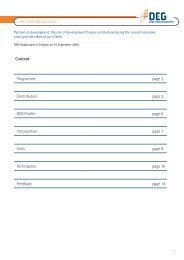Create successful ePaper yourself
Turn your PDF publications into a flip-book with our unique Google optimized e-Paper software.
<strong>COMPACI</strong>-<strong>News</strong><br />
Competitive African Cotton Initiative<br />
Cotton made in Africa in Benin 2006 – 2009<br />
Results and lessons learnt<br />
Wolfgang Bertenbreiter | Deputy Project Director of <strong>COMPACI</strong><br />
In Benin CmiA Initiative is carried by the AIC, which represents cotton<br />
producers and other actors operating in the cotton sector, ICA<br />
(ginning company) to process CmiA cotton separately and rapidly and<br />
ensures traceability, the Ministry of Agriculture and researchers from<br />
the Système National de Recherche Agronomique (national agricultural<br />
research system).<br />
From the start on all project stakeholders have been involved in participatory<br />
planning process. This induced the development of a strong<br />
ownership by the participating stakeholders as well as on farmers level<br />
and strengthened the cooperate identity with the initiative.<br />
The “CmiA” formula essentially consists of cheaper, more environmentally<br />
friendly crop protection practices, known in French as Lutte Étagée<br />
Ciblée (targeted threshold pest control – LEC), soil fertility, soil and<br />
water conservation management practices, post-harvest practices to<br />
ensure better quality cotton. Upstream, researchers are developing the<br />
main technologies required to achieve the objectives set (alternatives to<br />
endosulfan, organic/mineral fertilisation techniques, no till cultivation<br />
for soil and water conservation, etc.).<br />
In order to implement the intervention strategy, AIC trained extension<br />
agents in June 2006.<br />
The extension agent to GPC ratio was 1 to 4.7 resulting that all GPCs<br />
were visited at least once a fortnight. This facilitated the implementation<br />
of the ambitious training programme in LEC technology. In addition<br />
<strong>COMPACI</strong>-Benin<br />
“School uniforms“ for the children of the farmers<br />
participating in the programme<br />
Younoussa Imorou Ali<br />
In addition to the aim of increasing the smallholders’ income in the<br />
long term, the <strong>COMPACI</strong> programme in Benin has set the ambitious<br />
goal of accompanying the smallholders in the social area by implementing<br />
certain incentives. This not only concerns motivation campaigns<br />
but also measures intended to bind the smallholders to the<br />
programme. Such measures not least include the support of schooling<br />
in the project areas. Because the school enrolment rate in Benin<br />
continues to be low even though enrolment in primary schools is free<br />
of charge according to a decision of the central government. As the<br />
farmers themselves mainly point out, this low rate is owing to the lack<br />
of means needed to pay for the school requirements (school uniform,<br />
teaching material, books, notebooks, pencils, etc.). To encourage the<br />
farmers to look into solutions towards boosting school education, the<br />
“kaki subproject“ was initiated in Benin and has been implemented<br />
since the 2009-2010 term. A total of ten thousand (10,000) kaki uniforms<br />
was sewed and distributed to the children of the farmers participating<br />
in the CompACI programme (CmiA Phase 2).<br />
The private project partner in Benin (ICA-GIE Group) has volunteered to<br />
supply the required amount of fibres. The <strong>COMPACI</strong> programme bears<br />
the cost involved in processing<br />
CompACI<br />
the fibres to fabric. The farmers<br />
involved are to pay for the sew-<br />
AbT<br />
ing. Aid by Trade provided the<br />
‘’CmiA’’ logo which is attached<br />
Cotton farmers<br />
Townhal<br />
l<br />
to each uniform. The next edition<br />
of <strong>COMPACI</strong> <strong>News</strong> will report<br />
on the offical cerenomy of<br />
association<br />
hand over of school uniforms. •<br />
ICA-<br />
GIE<br />
Educational<br />
sector<br />
Benin<br />
to the training of the farmers, 550 village observers received a special<br />
training to make them proficient in counts and treatment thresholds.<br />
As CmiA is integrated in the general organisation of the sector, it is affected<br />
by any disruptions to the supply of inputs. In August 2006 there<br />
was a nationwide shortage of agro-chemicals in need of the implementation<br />
of LEC and, in spite of negotiations to bring in supplies from<br />
neighbouring countries; it was not possible to meet demand.<br />
Also in the seasons 2007-08 and 2008-09 there was a shortage of<br />
LEC products as distributors were unenthusiastic about promoting this<br />
technology that would reduce the amount of insecticides consumed and<br />
require them to maintain stocks of crop protection products that would<br />
probably not be used, because damage thresholds are rarely reached.<br />
In spite of the shortages of LEC products, the LEC technology could be<br />
applied to 40% of the CmiA area. Despite these problems, producers<br />
maintained a keen interest in the LEC scheme as studies conducted on<br />
the impact of LEC revealed that yield gains in the region of 300 kg/ha<br />
can be expected and that costs of the treatment are on average lower<br />
than that of the conventional treatments.<br />
For the more widespread introduction and the success of the LEC technology<br />
as well as to maintain farmers’ interest the timely delivery and<br />
availability of the LEC products on field level is crucial. Since LEC is now<br />
national policy in Benin, the experienced shortages are not expected to<br />
occur during the implementation of the Compaci project 2009 – 2012. •<br />
Younoussa Imorou Ali<br />
Senior techncial advisor to the GTZ-Benin<br />
National coordinator for the CompACI programme Benin<br />
Younoussa Imorou Ali – Studies of economics specialising in<br />
agriculture and development – has been a technical advisor with<br />
the Department “Agriculture and Environment” of GTZ in Benin<br />
since 2005 and in charge of the pilot phase of the Cotton made<br />
in Africa project. He has cooperated with several national and<br />
international institutions and NGOs with the aim of improving<br />
the living conditions of the poor rural population. He also had a<br />
senior position in a cotton ginnery of the ICA Group (Talon). In<br />
his capacity as supervisor of empiric research programmes on the<br />
income situation of farmers for the Agricultural Faculty of Benin<br />
(1994-1995) he focused on the support of the rural population in<br />
general and the supervision of the farmers’ living conditions in<br />
particular. In July 2009, he was appointed national coordinator<br />
for the <strong>COMPACI</strong>/GTZ programme in Benin.<br />
7







